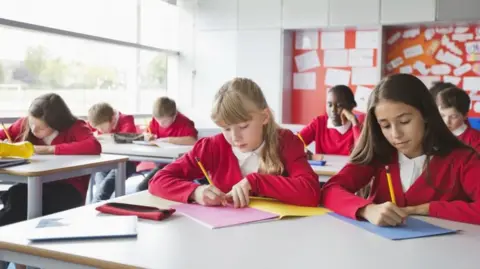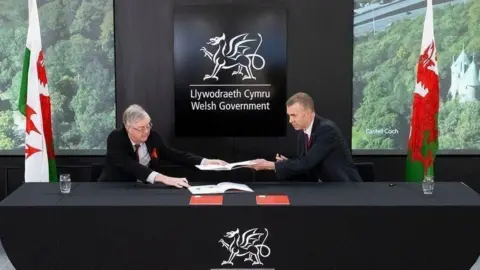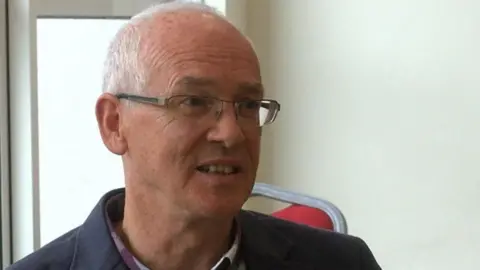'Historic' bill to boost Welsh learners passed in Senedd
 Getty Images
Getty ImagesA bill which aims to ensure all pupils in Wales finish school as "independent Welsh language users" has been passed in the Senedd.
The Welsh Language and Education (Wales) Bill aims to close the gap in Welsh speaking ability among pupils from different schools.
It also aims to make progress towards the 2050 target of a million Welsh speakers by strengthening the role of the language in education.
Welsh Language Secretary Mark Drakeford described the bill as "historic" and said currently "we don't get enough from the investment we make in teaching Welsh in English-medium schools".
The legislation sets out three language categories for maintained schools with a minimum amount of Welsh language education to be provided by schools in each category.
The three are "primarily Welsh language" (minimum 80%), "dual language" (50%), and "primarily English language, partly Welsh" (10%).
Speaking in the Senedd on Tuesday evening, Drakeford said the bill "will give every child the opportunity to become an independent, confident Welsh speaker by the time they finish compulsory education, a bill that will open doors for our pupils, a bill that provides new job opportunities, provides access to the rich culture of the Welsh language, and allows people to enjoy using the language in their everyday lives".
 Welsh Government
Welsh Government'Persuade more parents'
Speaking on the Dros Frecwast programme, on BBC Radio Cymru, Drakeford said "we don't get enough from the investment we make in teaching Welsh in English-medium schools, we don't get enough for the child, for the teachers, or for Wales as a whole".
"What we do in the bill is to change the whole system.
"There will be a duty on the government to set targets, there will be a duty on local authorities to say how they are going to help schools ensure children can speak Welsh and there will be duties on schools, and through the institute [National Institute for Learning Welsh] we are going to give more help to schools and teachers to help children in our schools, after a decade of learning Welsh, to become Welsh speakers."
Cymdeithas yr Iaith (the Welsh Language Society) have said "the aim should be Welsh-medium education for all and we are disappointed that politicians have not pursued this path."
But Drakeford rejected that idea, telling the BBC "it is not up to the government to make decisions like that on behalf of parents".
"I want to persuade more parents to use education through the medium of the Welsh language, but at the end of the day it is the choice of the parents and the child."
Conservative Tom Giffard said his party has been in favour of the objectives of this bill because "If more people want access to Welsh-medium education, then it's important that there is provision available to ensure that they're able do that".
Plaid Cymru's Cefin Campbell said his party "believes that every child should have the right to receive the precious gift of bilingualism through the education system and, as we all know, a complete education through the medium of Welsh is the most effective way to create confident and fluent Welsh speakers".
The legislation also seeks to ensure that steps are taken to provide intensive Welsh language immersion education throughout Wales, helping learners of all ages develop their skills.
Education Secretary Lynne Neagle said "our approach to late language immersion is unique. This bill builds on the excellent work already happening in across Wales, ensuring all children can learn, use and benefit from Welsh".
About 23% of pupils are educated in Welsh and the government's ambition is to increase that to 30% by 2030-31 and 40% by 2050.

The former chief executive of the Welsh Language Board (abolished in 2012), Meirion Prys Jones, told the BBC that he welcomes the bill because it is "important, timely, and it ties in with the target of one million Welsh speakers".
"It puts in place structures that we haven't had since the Senedd was established."
But he warned "there has been a complete lack of progress for ten years in the percentage of children receiving education through the medium of Welsh", which is around 23%.
"So at the moment the systems to persuade parents to choose Welsh-medium education are not working."
He warned "it is possible that not much will change. We need something that drives this forward. We need a clearer strategy".
